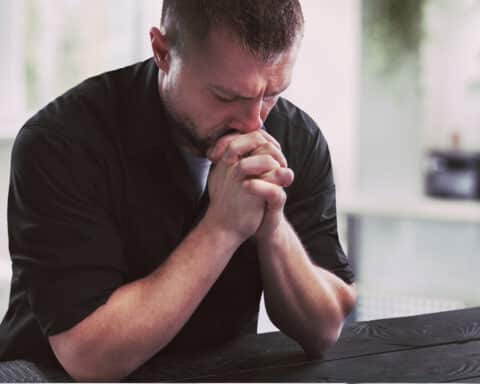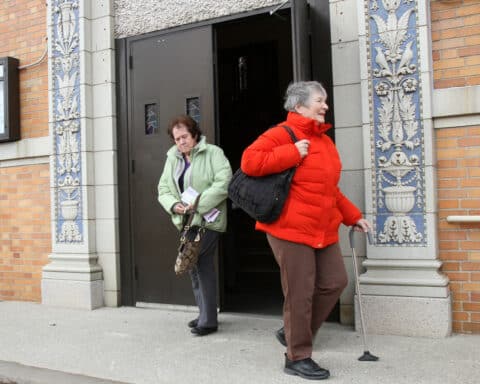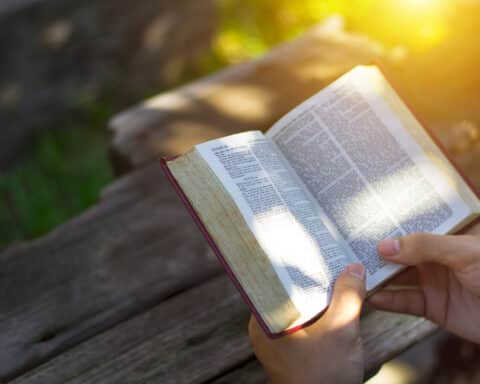This is the eighth installment of a 10-part series looking at the Ten Commandments.
Some form of the Seventh Commandment may be the very first thing young children are taught when they’re playing with other kids. Right along with “don’t bite your brother” is “don’t take things that aren’t yours.”
The positive commandment in the playroom is, of course, “share.” It seems like the Seventh Commandment is straight from the grammar school of morality — you’re taught it early and you should never forget it.
I think there’s something to be said for this sense of grammar-school morality to the Seventh Commandment, but I do not want to treat this commandment that lightly. Instead, I want to draw forth some lessons from previous commandments we have explored in this series to tease out the logic of the Seventh Commandment: “Thou shall not steal.”
Created as one
We are each created in such a way that we cannot be self-sufficient, either in material or spiritual matters. We draw life from others, and we are meant to give life to others. It is not only good that we exist, but it is also good that we exist together.
We should, therefore, pause now and again to think about what is the right meaning and the real limits of the concept of “private property.” This is an important tension that runs through the Church’s teaching on property, as we begin to see in the Catechism’s section on this commandment: “The seventh commandment forbids unjustly taking or keeping the good of one’s neighbor and wronging him in any way with respect to his goods. … For the sake of the common good, it requires respect for the universal destination of goods and respect for the right to private property” (No. 2401).
The right to private property is contextualized by a larger and more fundamental end: the “common good.” A common good is something we share — it is our integral fulfillment with and in each other. The paragraph thus concludes:
“Christian life strives to order this world’s goods to God and to fraternal charity.”
Charity is the final end: love of God and love of neighbor. This Seventh Commandment — like all the commandments — is ordered to that final end.
The second paragraph of this section of the Catechism dives deeper into the tension between the universal destination of goods and the right to private property:
“In the beginning God entrusted the earth and its resources to the common stewardship of mankind to take care of them, master them by labor, and enjoy their fruits. The goods of creation are destined for the whole human race. However, the earth is divided up among men to assure the security of their lives, endangered by poverty and the threat of violence. The appropriation of property is legitimate for guaranteeing the freedom and dignity of persons and for helping each of them to meet his basic needs and the needs of those in his charge” (No. 2402).
This reiterates the basic principle that the earth and all its goods are created for the benefit of all human beings. To ensure that benefit for all, the common property of the earth may be apportioned to individuals. This is the basis of the right to private property: every human person deserves to have his needs cared for as appointed by God.
In a world that is marred by sin, with war and violence, the protection of property is necessary, especially for the sake of those of us who are most vulnerable and who, without proper protection, might very well be stripped of their property by those who wield more worldly power and influence. Property becomes private so that all may benefit, not so that some may benefit at the expense of others.
Life or death
Contemplating the Fifth Commandment, we noticed that there are only two ways: the way of death and the way of life. In Christ, the choice is for life. To fail in the action of serving each other’s good is to harm each other. It is not enough to say “At least I never murdered anybody.”
With that in mind, we should consider the words of St. John Chrysostom, whom the Catechism quotes when speaking of the Seventh Commandment: “Not to enable the poor to share in our goods is to steal from them and deprive them of life. The goods we possess are not ours, but theirs. The demands of justice must be satisfied first of all; that which is already due in justice is not to be offered as a gift of charity” (No 2446).
St. John is saying that when some of us take up more resources than we need, while others are deprived of resources by our consumption, then we who take the resources are living unjustly. We sin against God’s justice, and, therefore, we are incapable of charity.
Clearly, there is no third way. It is not enough to say, in Christ, “I never stole from anybody.” If we hoard goods in excess of our needs, or profit off of someone else’s misery, or live in such a way that others bear the consequences of our lifestyle, then we sin before God.
Pope Francis builds upon this kind of thinking in his encyclical Laudato Si’. Over and over again, he appeals to the sensibilities and responsibilities of wealthier nations, powerful corporations, and prosperous or even secure individuals, to heed the plight of the poor who bear the brunt of the ecological consequences of worldwide patterns of consumption. He speaks about this in terms of food, climate, drugs, human trafficking and more, but these few lines from his section about access to water may stand-in for the larger point:
“Even as the quality of available water is constantly diminishing, in some places there is a growing tendency, despite its scarcity, to privatize this resource, turning it into a commodity subject to the laws of the market. Yet access to safe drinkable water is a basic and universal human right, since it is essential to human survival and, as such, is a condition for the exercise of other human rights. Our world has a grave social debt toward the poor who lack access to drinking water, because they are denied the right to a life consistent with their inalienable dignity” (No. 30).
In Christ, it is not enough to not steal. It is also the duty of Christians to heed the consequences of our actions and omissions to see how others might suffer from them, then amend our ways for the sake of justice and the common good.
Getting personal
Beginning with the First Commandment, we noted that each commandment is a personal address from a personal God who calls us forth to become fully personal. To do that, we have to hear God speaking to us personally and always consider others as persons of equal dignity. A divine commandment about property seeks to protect us from becoming obsessed with things in place of respecting ourselves and each other as persons.
When we set our hearts on whatever material gain we want to take from others, we do not just depersonalize others, we also depersonalize ourselves. We turn ourselves into consumers or masters or schemers or thieves. We stop relating to each other as persons.
Our only true and final good is our common good — the good we share with each other: the exchange of charity, the life of love in the kingdom of God. The commandments point us only toward that life and point us away from everything that obstructs that full and final joy.
Stealing, in all its forms, keeps us from the joy intended for us. Doing justice — in terms of rendering unto others what is due — heals what’s wrong with our human community. On the basis of justice, we become free to deal with each other in charity.
Private property is good only with restrictions and tempered by personal responsibility, with due regard for the needs, rights and dignity of our neighbors. In a globalized society, serious and regular examination of conscience and of circumstances needs to be conducted so that we as individuals, communities and nations, do not take life away from others to support our preferred lifestyle.
Leonard J. DeLorenzo, Ph.D., works in the McGrath Institute for Church Life and teaches theology at the University of Notre Dame. His new book is “A God Who Questions” (OSV, $12.95).





